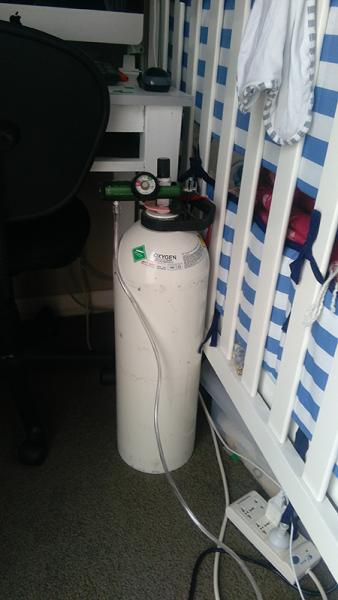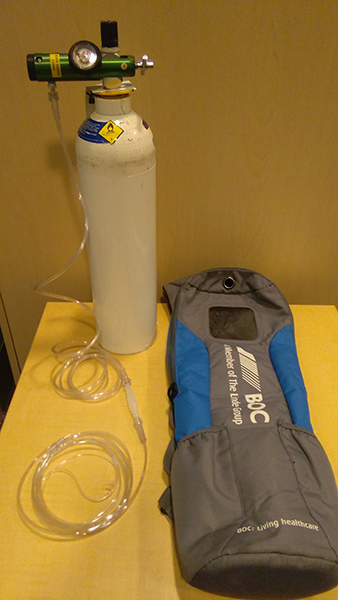

Pēpi may need to have oxygen at home if they have:
Your baby should be feeding and growing appropriately and be medically stable. There are no specific 'numbers' for this growth as it will depend on many things that are individual to your baby. Your paediatrician and neonatal nurse can give you advice on this.
Your baby will need a supply of oxygen.
In most regions of Aotearoa New Zealand, this oxygen supply will be with oxygen cylinders. You'll get these delivered to your home free of charge. You'll order these every week.
Large tank
It is likely you'll will get a large tank. Put it somewhere safe where you can't easily knock it over.
Long tubing
The tank will come with long extension tubing. This connects to the cylinder and to your baby's nasal prongs. It lets you move around the house without moving the oxygen tank.
Photo of a large oxygen tank

Small travel cylinder
You will also get a smaller travel cylinder. You can take this out of the house in the car or the pram. A member of your healthcare team will show you how to use the oxygen cylinders before you leave hospital.
Photo of a small travel cylinder

In other parts of Aotearoa New Zealand, an oxygen concentrator will deliver oxygen to your baby. If you use a concentrator, you will also have a small oxygen cylinder for backup in case there is a power cut. You can also use the small cylinder for travelling in the car or pram.
An oxygen concentrator works by drawing in the air that we all breathe and removing part of the air called nitrogen. This increases the oxygen levels and delivers purified oxygen to your baby.
Make sure you let your power company know that your baby is using home oxygen in case of a power cut.
The power to run the oxygen concentrator costs approximately $1 to $2 a day. It is worth talking to your local Work and Income New Zealand (WINZ) office about whether you can get funding for this. Speak to your homecare nurse about getting a letter of support for both your power company and WINZ. In some regions of Aotearoa New Zealand, healthcare providers only use oxygen cylinders. They will deliver these to your home for free.
Your baby will breathe oxygen through small plastic tubes (nasal cannulae) that sit under the nose. A dressing and tape will hold the tube in place and protect the skin.
Some pēpi will need an oxygen saturation monitor. But in most cases, pēpi only need a monitor for running overnight oximetry to help with oxygen weaning.
See the KidsHealth page on overnight oximetry [1].
It's important to be careful when using oxygen in your home. Your nurse will talk to you about safety before your child leaves hospital.
There should be a no smoking policy in your home.
Remember to display a no smoking sign clearly in your home and car.
Do not take your baby within 2 meters of open fires, gas heaters, gas stoves, gas ovens, barbecues, lit cigarettes or similar items.
If you have an oxygen concentrator, it's important to keep it in an open area clear of walls, curtains, and furniture.
Do not use, or put the oxygen tubing near electric heaters.
Securely tie the oxygen cylinder in a fixed position while in the car.
Partly open the car windows to avoid the cylinder overheating.
It's important to keep your baby away from people with other infections as much as possible. This means staying at home more than usual, particularly over your baby's first winter. Ask anyone who is unwell not to visit you.
In most regions, there is a neonatal homecare or outreach nurse. But these may have a different name in different regions. This nurse will be specialised in looking after your baby's specific needs. They will have direct links back to the hospital.
If your baby is attached to oxygen, it can be difficult getting out of the house.
Friends and relatives may be willing to help but there may also be funding available to help with respite care (such as carer support days). Talk to your nurse about what might be available in your area.
See the KidsHealth page about what financial help might be available [2].
If friends or family can help, encourage them to do the household chores so that you can spend more time with your baby. Bringing meals is also helpful. Ask them to stay away if they or their family are unwell.
If you think it is an emergency, don't hesitate to dial 111 within New Zealand (use the appropriate emergency number in other countries).
It is a good idea to become a member of St John Ambulance. There is a small fee each year which gives you free unlimited ambulance use for your whole family. If you cannot afford the fee, contact your local WINZ case worker. They may be able to help you.
Find out about St John membership [3].
During working hours you can ring your homecare or outreach nurse. After hours it may be best to call the Newborn Intensive Care Unit (NICU) but your nurse will help you develop a plan.
Soon after going home, it is a good idea to make an appointment to see your GP so they can become familiar with your baby's condition. Your GP will be an important contact for you when your baby becomes unwell.
Before your baby goes home from hospital, your healthcare team will give you advice about what symptoms are normal and what are not.
When you are home, your homecare nurse will talk with you about how to monitor your baby's progress.
Call your homecare nurse or family doctor if you notice your child showing any of the following signs:
You can watch some videos to become familiar with the signs that your baby is struggling to breathe [4].
The content on this page has been developed and approved by the Clinical Reference Group of the Newborn Clinical Network, Paediatric Society New Zealand.
Photos of oxygen tanks are by KidsHealth.
This page last reviewed 31 October 2023.
Email us [6] your feedback
Links
[1] https://kidshealth.org.nz/overnight-oximetry
[2] https://kidshealth.org.nz/financial-help-when-your-child-has-disability-or-chronic-condition
[3] https://www.stjohn.org.nz/support-us/join-ambulance-membership/
[4] https://kidshealth.org.nz/signs-children-are-struggling-breathe
[5] https://kidshealth.org.nz/home-oxygen-what-else-do-i-need-know
[6] https://kidshealth.org.nz/contact?from=http%3A%2F%2Fkidshealth.org.nz%2Fprint%2F2154